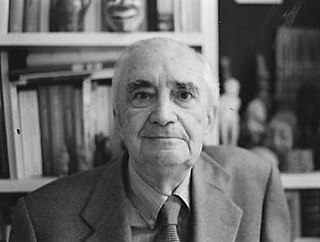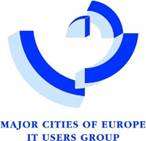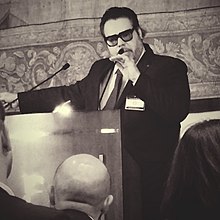
Virgilio Tosi is an Italian documentary filmmaker and historian of early film.
The ethics of artificial intelligence is the branch of the ethics of technology specific to artificially intelligent systems. It is sometimes divided into a concern with the moral behavior of humans as they design, make, use and treat artificially intelligent systems, and a concern with the behavior of machines, in machine ethics. It also includes the issue of a possible singularity due to superintelligent AI.

The Major Cities of Europe IT Users Group is an independent association of chief information officers, IT managers and department heads of cities. The group was founded in 1982 as a result of an initiative by the Greater London Council. Since then it has focused on innovation in cities, driven by information and communications technology.
Sergio Fabbrini is an Italian political scientist. He is Head of the Department of Political Science and Professor of Political science and International relations at Libera Università Internazionale degli Studi Sociali Guido Carli in Rome, where he holds the Intesa Sanpaolo Chair on European Governance. He had also the Pierre Keller Visiting Professorship Chair at the Harvard University, Kennedy School of Government (2019/2020). He is the co-founder and former Director of the LUISS School of Government He is also recurrent professor of Comparative Politics at the Institute of Governmental Studies at the University of California at Berkeley.

Raffaele Marchetti is an Italian political scientist and editorialist.
The Association of European Cinematheques is an affiliation of 49 European national and regional film archives founded in 1991. Its role is to safeguard the European film heritage and make these rich audiovisual records collected and preserved by the various film archives accessible to the public. ACE is a regional branch of FIAF Fédération Internationale des Archives du Film / International Federation of Film Archives. ACE members are non-profit institutions committed to the FIAF Code of Ethics.

Roberto Gualtieri is an Italian historian, academic and politician of the Democratic Party (PD), incumbent Mayor of Rome since 2021 and Minister of Economy and Finances in the second government of Giuseppe Conte from 2019 until 2021. He previously was a Member of the European Parliament from 2009 to 2019, where he chaired the influential Economic and Monetary Affairs Committee within the Parliament from 2014 until 2019.

Giorgio Pacifici is an Italian sociologist.

Osservatorio Balcani e Caucaso Transeuropa is a think tank and online newspaper based in Trento, Italy, and specialised on South East Europe.

Simon Rogerson is lifetime Professor Emeritus in Computer Ethics at the Centre for Computing and Social Responsibility (CCSR), De Montfort University. He was the founder and editor for 19 volumes of the Journal of Information, Communication and Ethics in Society. He has had two careers; first as a technical software developer and then in academia as reformer. He was the founding Director of CCSR, launching it in 1995 at the first ETHICOMP conference which he conceived and co-directed until 2013. He became Europe's first Professor in Computer Ethics in 1998. His most important research focuses on providing rigorously grounded practical tools and guidance to computing practitioners. For his leadership and research achievements in the computer and information ethics interdisciplinary field he was awarded the fifth IFIP-WG9.2 Namur Award in 2000 and the SIGCAS Making a Difference Award in 2005.
Pasquale Verrusio was an Italian painter, sculptor and engraver.
Marc Saner is a Full Professor at the University of Ottawa, Canada and Departmental Science Advisor to Natural Resources Canada.
Algorithmic entities refer to autonomous algorithms that operate without human control or interference. Recently, attention is being given to the idea of algorithmic entities being granted legal personhood. Professor Shawn Bayern and Professor Lynn M. LoPucki popularized through their papers the idea of having algorithmic entities that obtain legal personhood and the accompanying rights and obligations.
Giovanni Battista Dagnino is an Italian economist and academic. He is the Chair of Management and Professor of Digital Strategy at the Libera Università Maria SS. Assunta University of Rome, where he is the Founding Director of the MSc Degree in Economics and Management. He is known for his work on coopetition strategy and for the study of temporary competitive advantage.

Paola Pisano is an Italian academic and politician for the Five Star Movement. In September 2019, she was appointed Minister for Technological Innovation in the Conte II Cabinet.
The regulation of artificial intelligence is the development of public sector policies and laws for promoting and regulating artificial intelligence (AI); it is therefore related to the broader regulation of algorithms. The regulatory and policy landscape for AI is an emerging issue in jurisdictions globally, including in the European Union and in supra-national bodies like the IEEE, OECD and others. Since 2016, a wave of AI ethics guidelines have been published in order to maintain social control over the technology. Regulation is considered necessary to both encourage AI and manage associated risks. In addition to regulation, AI-deploying organizations need to play a central role in creating and deploying trustworthy AI in line with the principles of trustworthy AI, and take accountability to mitigate the risks. Regulation of AI through mechanisms such as review boards can also be seen as social means to approach the AI control problem.

Ferdinando Scala is an Italian biologist, science and technology journalist and historian, specialized in strategy and military history.

The Polo del '900 is a cultural centre of Turin, that hosts the seats of 26 partner institutions. The centre is housed in the so-called Quartieri Militari of the Quadrilatero Romano, a juvarrian compound, in the Palazzi San Celso and San Daniele, built on the design of Filippo Juvarra, which house the library, the archive, the areas for events, exhibitions and performances, classrooms and the permanent exhibitions of the Museo diffuso della Resistenza, della deportazione, della guerra, dei diritti e della libertà.

Federico Frattini is an Italian strategy, innovation and technology management scholar.

Paolo Benanti is an Italian presbyter, theologian and academic of the Third Order Regular of St. Francis. He teaches at the Pontifical Gregorian University and is advisor to Pope Francis on issues of artificial intelligence and technology ethics.












